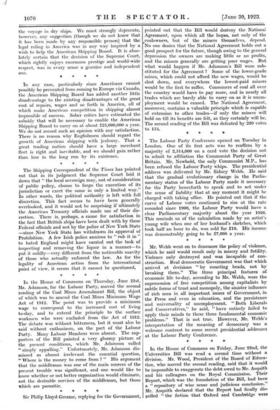Sir Philip Lloyd-Greame, replying for the Government, pointed out that
the Bill would destroy the National Agreement, upon which all the hopes, not only of the eoalowners, but of the miners themselves, depend. No one denies that the National Agreement holds out a good prospect for the future, though owing to the general depression the owners are making little or no profits, and the miners generally are getting poor wages. But what would happen if Mr. Adamson's Bill were sub- stituted for the Agreement ? Some of the lower-grade mines, which could not afford the new wages, would be shut down, and everywhere the lowest-paid miners would be the first to suffer. Consumers of coal all over the country would have to pay more, and in nearly all trades .which are barely able to carry on as it is unem- ployment would be caused. The National Agreement, moreover, contains a valuable principle which is capable of extension to other trades—if only the miners will hold on till its benefits are felt, as they certainly will be. The second reading of the Bill was defeated by,230 votes to 154.
* * * *










































 Previous page
Previous page